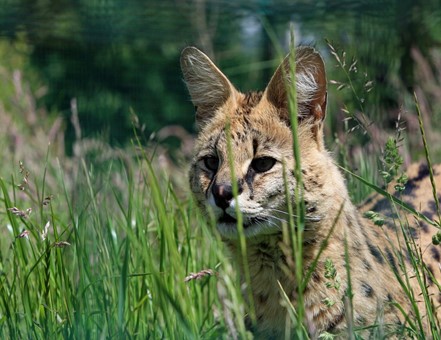Usually, serval cat owners get kittens that they can raise and hand-feed or bottle-feed. This is important because African serval cats can develop a bond with their human owners and this one-human relationship can stay for life. It is also a risk, because when the time comes that you cannot keep your serval with you anymore, for whatever reason, then you will have a problem as they don’t take lightly to having new owners. They will stick to their one-human bond.
When you bond with your kitten, you will have to spend time playing with it. Always keep it at eye level. You will have to exercise a lot of patience and gentle handling, especially when training your cat. You can litter-train your serval cat, but still expect it to pee all around as it marks its territory. It is not trying to rile you up, it is a natural instinct.
Remember that a serval cat will not be too excited to meet other people or other pets. They are solitary and shy and will shun other interaction apart from yours. They can be afraid of strangers and visitors, so never force your cat to “meet” someone else.
The serval cat is active at night—this means that you will have to dedicate some parts of your night to bond with it, or to accept that you cannot keep it still while you sleep. If your serval will be housed within your home while it is a kitten, then you should baby-proof the room so that your cat won’t break anything and it won’t get hurt.
While most small domesticated cats can be quite affectionate, the level of affection that your serval cat can show is at best medium. It is rarely kid-friendly. It won’t even be too friendly with adults. It is also not very forthcoming with your other pets that you may have at home. Don’t expect it to jump for joy and play with your other household pets.
On the other hand, the African serval cat has a high need for exercise. It will always want to move its long legs by jumping and pouncing. It has a very high level of energy and playfulness. And even if it is a cat that loves to play, it doesn’t really like to be taught. It has a low trainability level despite its high intelligence. In the wild, it will use its cunning skills to survive and thrive, but don’t expect it to use its high IQ to learn tricks from you.
The African serval cat has a moderate tendency to vocalize. It will growl when it is in a playful mood or when it is scared or is trying to scare someone off. You won’t easily know it unless you have spent quite some time with it, to understand its vocalizations. A high-pitched call from your African serval may mean it is in pain or it is calling out other servals. Like most domesticated cats, you will also hear your serval purr and make spitting noises.
Do you want to take your serval cat for a walk? You can do so. But you may need a special harness as serval cats are much stronger than regular domesticated cats. You don’t want it to drag you or get away from you when it starts to run off and chase something it perceives as prey.
If you plan on traveling, you may not always be able to bring your serval cat with you, unlike a small domesticated cat that you can place in a cage. You should put your African serval with someone who can care for it while you are on a vacation or whatever reason you need to go away.
Keep in mind that it doesn’t take well with new owners or new people taking care of it. Make sure to keep both your cat and the person caring for it safe by planning measures beforehand. You can place the serval cat in its enclosure so that it won’t have contact with your friend who is taking care of it. The person should just monitor if the cat is safe and doesn’t encounter safety or health issues.






 Author and long-time animal lover. Sharing knowledge on pet care through experience and the written word.
Author and long-time animal lover. Sharing knowledge on pet care through experience and the written word.